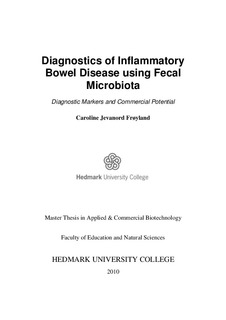| dc.description.abstract | Establishing the diagnosis of Inflammatory Bowel Disease (IBD) with its two main sub forms
Crohn‟s Disease (CD) and Ulcerative colitis (UC) are based on medical history, clinical
evaluation, laboratory tests, endoscopy, radiology and histology. However no gold standard
exists. The lack of appropriate diagnostic tools leads to delayed and incorrect treatment of
IBD patients. A substantial amount of patients diagnosed as CD are later reclassified as UC
and opposite. Also the type of colitis remains unclassified in many patients. In addition, non-
IBD patients presenting with similar symptoms as IBD are unnecessarily investigated with
invasive tests leading to increased hospitals costs.
The cause of IBD is not yet completely described, but most evidence points to a combination
of genetic predisposition, immunological factors, environmental triggers, and gastro intestinal
(GI) microbes. However, neither the types of microbes responsible for the diseases nor
changes in the microbiota as a result of the diseases have been sufficiently identified. The aim
of this thesis was to evaluate the potential of using the fecal microbiota for IBD diagnostics.
This was achieved through a combination of a literature study, lab study and investigations of
the commercial potential including a patent search.
The literature study revealed conflicting evidence related to the amounts of bacteria in IBD
patients relative to controls. Nevertheless, a majority of the articles agreed in decreased
amounts of Clostridia species and increased amounts of Gammaproteobacteria species in the
GI microbiota of IBD patients.
The lab study comprised an evaluation of a genetic test, GA-map™, commercialized by
Genetic Analysis AS (GA). By using variable regions in the 16S rRNA gene, simultaneous
detection and identification of multiple bacteria in a complex mixture of DNA is possible.
Probes and analytic methods are suitable for several types of diagnostic tests among other
IBD. A sequence analysis of fecal samples from 152 IBD patients and 105 non-IBD controls
was performed. Significantly a probe detecting increased relative amounts of Proteobacteria
and Bacteroidetes species was identified as a new possible diagnostic test for CD patients.
A search in European and American patent databases revealed several patents related to IBD
diagnostics. Especially important, a patent application from George Mason University comprised claims referring to IBD diagnostics by using the microbial community of the
digestive tract and lumen. If issued, this application could influence the freedom to operate to
companies focusing on bacterial markers in IBD diagnostics. Few other patents or patent
applications from the search query include claims for identification of bacteria in fecal
samples.
A concluding remark from examining the commercial potential of IBD diagnostics in this
thesis is to tailor make a diagnostic test separating IBD from irritating bowel syndrome (IBS),
a common functional disease frequently confused with IBD. Based on estimations of price
and profit per test, a €7Mill research budget was recommended for the normal case scenario.
Finally it is concluded that development of a diagnostic test based on fecal microbiota has a
commercial potential within the proposed framework. | en_US |
